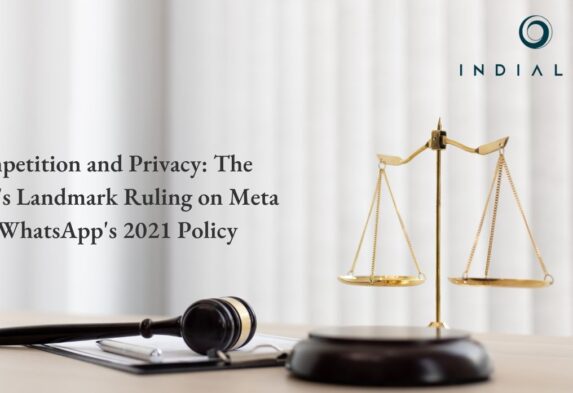Competition and Privacy: The CCI’s Landmark Ruling on Meta and WhatsApp’s 2021 Policy


In a significant ruling, the Competition Commission of India (CCI) has concluded its investigation into Meta Platforms, Inc. and its subsidiary WhatsApp, addressing allegations of anti-competitive practices stemming from a controversial privacy policy update in 2021. This article delves into the key findings and implications of the CCI’s investigation.
Table of Contents
Background of the Investigation
The inquiry into Meta and WhatsApp was fuelled by concerns raised about the companies’ market behaviour following the release of a new privacy policy in early 2021. Multiple cases were filed (SM Case Nos. 01, 05, and 30 of 2021), prompting a Supreme Court ruling that enabled the CCI to investigate potential violations of competition law.
On January 12, 2023, the Director General (DG) of the CCI presented an investigation report, outlining findings regarding Meta’s operations as a group and its influence within the messaging app market.
Key Findings of the CCI
Definition of the Relevant Market
The CCI defined the relevant market as the Over-The-Top (OTT) messaging apps sector in India. Within this framework, WhatsApp was recognized as the dominant player, claiming a substantial market share in messaging services across the country.
Meta’s Dominance
The CCI’s investigation revealed that Meta, through WhatsApp, holds significant market power. By leveraging its extensive user base and comprehensive data collection practices, WhatsApp has maintained its strong position in the competitive landscape of messaging applications.
Controversial Data Collection Practices
Central to the investigation was WhatsApp’s 2021 policy update, which required users to accept extensive data-sharing agreements without the option to opt-out. The DG classified this approach as coercive, thereby breaching Section 4(2)(a)(i) of the Competition Act, which prohibits dominant firms from imposing unfair conditions on consumers.
The report further indicated that the level of data collected by WhatsApp was excessive in relation to the services provided, raising significant concerns about consumer privacy and competition. The mandated sharing of user data with other companies within the Meta umbrella was seen as a means of creating barriers to competition in the online display advertising market.
Leveraging Dominance
The CCI concluded that Meta’s practices constituted an abuse of its dominant market position by leveraging its control over the messaging sector to enhance its power in the display advertising market. This behavior was found to be in violation of Sections 4(2)(c) and 4(2)(e) of the Act.
Responses to the Findings
Meta and WhatsApp’s Defence
In response to the investigation’s conclusions, Meta and WhatsApp contested the findings, asserting that the 2021 update did not introduce new capabilities for data collection. They argued that user consent was genuinely voluntary, not coercive. The companies criticized the investigation for lacking a thorough economic analysis and for not adequately considering the dynamic nature of digital markets.
Support from Advocacy Groups
Conversely, the Internet Freedom Foundation (IFF) supported the DG’s findings, emphasizing the necessity for transparency and user choice in data management practices, particularly in the context of dominant digital platforms like WhatsApp.
CCI’s Conclusions and Next Steps
The CCI determined that Meta, through WhatsApp, engaged in practices that violated the provisions of competition law. The commission directed Meta to discontinue the identified anti-competitive practices and signalled that penalties would be forthcoming, commensurate with the severity of the violations identified in the investigation.
Confidentiality and Transparency
Alongside its legal findings, the CCI addressed the handling of confidential information submitted by the parties involved during the investigation. Measures have been implemented to ensure sensitive data is safeguarded, while still allowing for transparency in the public discourse surrounding the ruling.
Penalties Imposed
In light of these findings, the CCI has imposed a penalty of ₹213.14 crore (approximately $25.7 million) on Meta for violating the provisions of the Competition Act. The company is required to deposit this amount within 60 days of receiving the order. Additionally, the CCI has directed WhatsApp to implement several remedies to ensure compliance, including:
Ceasing Data Sharing: WhatsApp is prohibited from sharing user data with other Meta companies for advertising purposes for a period of five years.
User Choice: Users must be provided with an opt-out option for data sharing, allowing them to manage their data preferences prominently through the app.
Transparency Requirements: WhatsApp must include detailed explanations in its policy regarding the data shared with Meta, specifying the purpose of such sharing.
The CCI’s ruling emphasizes the need for dominant firms to uphold fair competition and protect consumer interests, particularly in the rapidly evolving digital marketplace.




